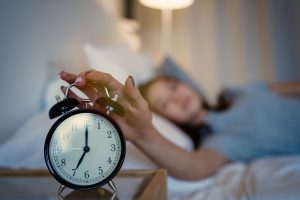
A recent survey found that 32 percent of people feel more tired these days than before the pandemic began, and 28 percent said they are getting less sleep than they did in pre-pandemic times.
Lots of that, according to some experts, may be tied to a lack of structure in their day.
These changes in routine may be contributing to something called “Delayed Sleep Phase Syndrome,” where the disturbed schedule/routine might be throwing off sleeping rhythms.
Sleep trouble can be fuelled by anxiety and depression or obstructive sleep apnea.
So, what are people doing about their poor sleeping habits and subsequent fatigue?
The survey found that:
- 36 percent have tried to reduce stress
- 33 percent have tried to manage anxiety
- 20 percent have reduced or eliminated caffeine
- 19 percent have tried meditating before bed
- 18 percent have altered their sleeping environments with products like blackout curtains or white noise machines.
- 16 percent avoided evening screen time
- 16 percent were regularly taking over the counter (OTC) sleep aids
Those are all pretty good ideas except the sleep aids. Avoiding alcohol within a few hours before bed may also help. And those with sleep apnea should look into a CPAP machine.
Another thing you might not be doing is getting up when you can’t sleep. If you’ve been lying in bed for 25-minutes and still find yourself awake, get up out of bed and do something calming. Reading or knitting are good options. But there are two rules: no screens, and be sure to do it under yellow light, not blue light.
Only using your bed for sleep and sex is also a good idea. Even if you work in your bedroom, don’t use your bed to do work or watch TV. Ideally, the bedroom is a work/TV-free zone.
If you have to a look at a screen when you’re in your bedroom, stand. This can at least help you get tired.
Lastly, exercise is healthy and can contribute to better sleep. But it can also keep you awake if it’s done too late. Your body needs time to wind down, so try and exercise at least four hours before bedtime.